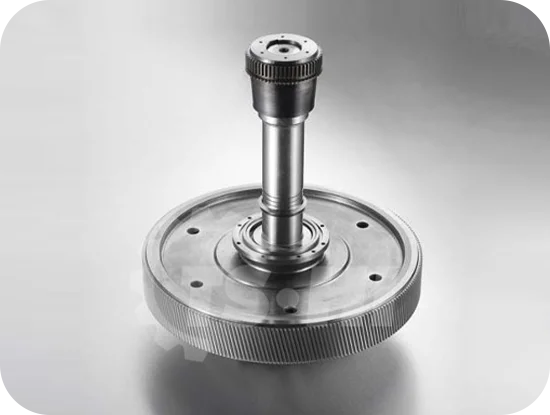- This topic is empty.
-
AuthorPosts
-
2025-02-25 at 1:37 pm #83665
In industries such as manufacturing, HVAC systems, automotive, and energy production, compressors are indispensable machines that help regulate pressure, airflow, and volume. At the heart of most compressor systems lies an essential component: the compressor gear. Despite often being overlooked, the compressor gear is crucial for the efficient operation of the system. It ensures the proper transmission of power, optimizes the compressor's performance, and enhances overall system reliability.
The compressor gear plays an essential role in driving the compressor's components, transmitting rotational motion from the driving motor to the compressor's core components. Its proper functioning is critical in maximizing system efficiency, reducing energy consumption, and extending the life of the equipment. In this article, Tianshan will explore how compressor gear contributes to efficiency.
What are Compressor Gears?

At its core, a compressor gear is a mechanical device that connects the motor to the compressor, transferring the rotational motion from the motor to the compressor's mechanism. This transfer of motion powers the compressor's components, enabling it to perform the crucial task of pressurizing and regulating airflow within a system.
Compressor gears are typically constructed from high-strength materials such as steel or durable alloys, given that they must withstand high torque and constant motion under demanding conditions. The gear system is engineered to handle significant loads, ensuring that power is transmitted effectively while minimizing energy losses, heat generation, and mechanical wear.
These gears are found in various types of compressors, including reciprocating, screw, and centrifugal compressors. In each case, the compressor gear ensures that the compressor operates smoothly and efficiently, with minimal energy loss and wear. Ultimately, an efficient compressor gear system is essential for minimizing downtime, reducing maintenance costs, and enhancing the overall system's performance.
How Compressor Gears Enhance Operational Efficiency
Compressor gears are integral to the efficient functioning of compressors, helping optimize their performance in several ways. Their design and function directly influence the energy consumption, performance consistency, and longevity of the compressor system. Here are several ways in which compressor gears contribute to system efficiency:
1. Transmission of Power and Control of Speed
One of the most important functions of compressor gears is the transmission of power from the motor to the compressor. The gear system ensures that the motor's rotational speed is adjusted to match the compressor's operational needs. This is accomplished through gear ratio adjustments, which help optimize the compressor's performance by controlling the speed and torque applied to the system. By using the correct gear ratio, the motor's speed can be reduced while increasing the torque to the compressor's components. This adjustment ensures that the compressor operates at its most efficient speed, minimizing energy consumption while maintaining the required output. An efficient gear ratio not only optimizes power transmission but also helps reduce mechanical strain on the system, prolonging its service life.
2. Load Distribution and Stress Reduction
Compressor gears help distribute the mechanical load evenly across the system, which helps reduce stress on individual components. This is particularly crucial for ensuring the longevity of the compressor and avoiding premature failure. When gears are designed to distribute the load evenly, they prevent the occurrence of localized stress points, reducing the risk of component wear and system failures. Proper load distribution allows for smoother operation, as the torque is spread out across the system's components, minimizing the risk of overheating and reducing energy consumption. Furthermore, it ensures that the compressor operates within its optimal load capacity, enhancing its overall performance and minimizing the need for repairs or maintenance.
3. Heat Dissipation and Minimization
Another crucial factor in compressor performance is the generation of heat. While heat is a natural byproduct of mechanical motion, excessive heat can degrade system performance and efficiency. Compressor gears are designed to reduce friction, one of the primary causes of heat buildup in rotating systems. By minimizing friction between gear teeth, high-quality compressor gears help to prevent overheating and maintain efficient operation. In addition to friction reduction, the use of advanced gear materials and coatings can further improve heat dissipation. For example, many modern compressor gears incorporate specialized alloys or lubricants that enhance heat resistance and help maintain stable operational temperatures. This contributes to longer component life, more efficient performance, and reduced downtime for maintenance.
The compressor gear is a fundamental component of any compressor system, playing a critical role in energy transmission, load management, and system efficiency. By selecting the right type of compressor gear and maintaining it properly, businesses can maximize the performance, longevity, and energy efficiency of their compressor systems. By optimizing compressor gears, industries can reduce operational costs, minimize downtime, and achieve a higher level of reliability, ultimately leading to greater operational efficiency and profitability.
https://www.tianshangear.com/Gear-for-air-compressor
http://www.tianshangear.com
Changzhou Tianshan Heavy Industry Machinery Co., Ltd. -
AuthorPosts
- You must be logged in to reply to this topic.


